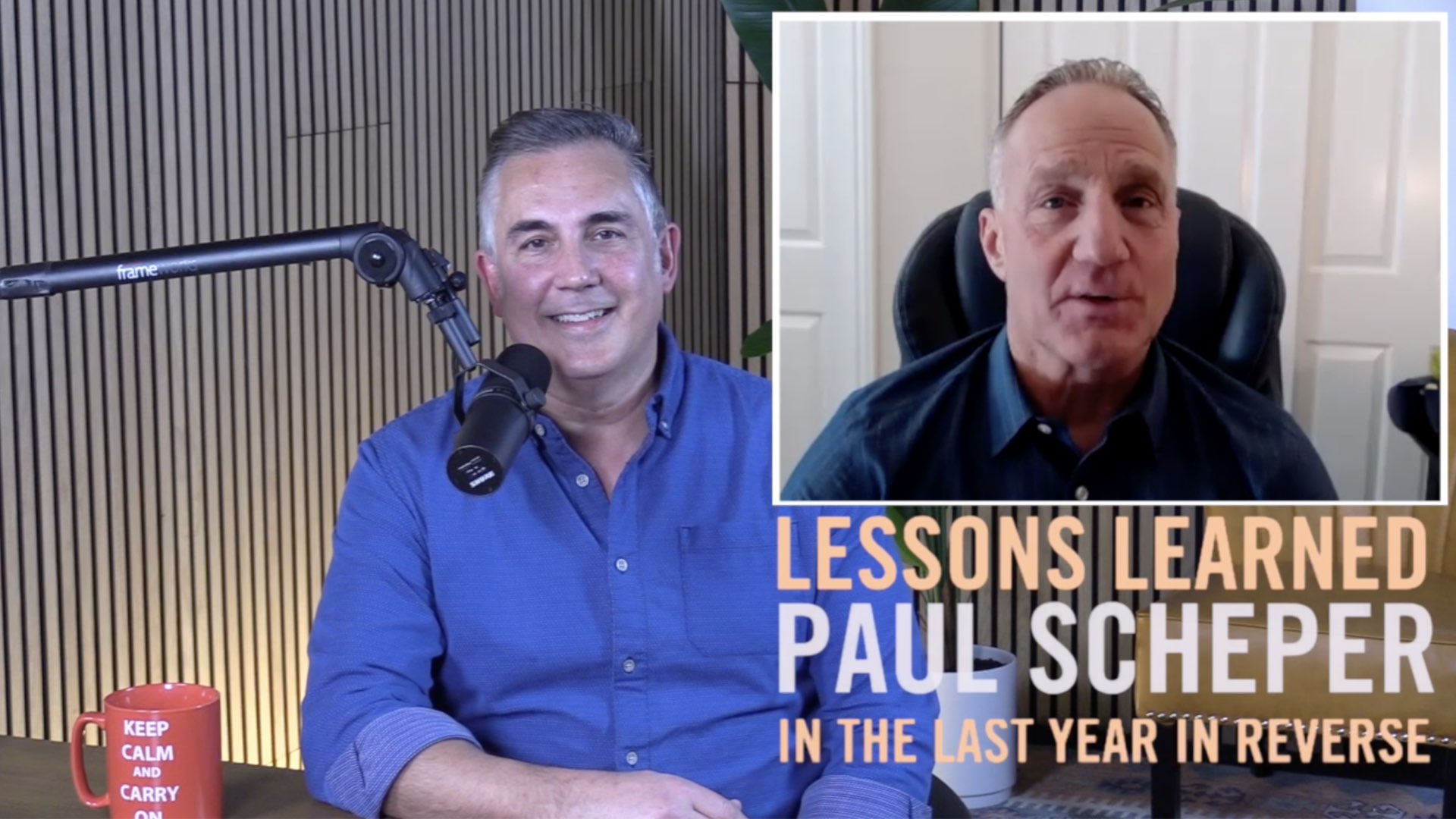Thomas Jefferson distilled some of life’s most important lessons in one book. Here are ten rules for life to ponder…
Continue readingWhat do you have to show for today?
Here are three practical ways reverse pros can put ChatGPT to use to grow their business.
Continue readingLife’s Sparring Partner
Here are three practical ways reverse pros can put ChatGPT to use to grow their business.
Continue reading3 Ways HECM Pros Can Leverage Chat GPT
Here are three practical ways reverse pros can put ChatGPT to use to grow their business.
Continue readingTurning Campfires into Bonfires
Do you feel like your often putting out fires at work or home? Here’s how to get relief…
Continue readingEscaping the Velvet Rut
How to get out of the Velvet Rut
We seek comfort, familiarity, and routine. It’s natural. But recognizing when our patterns have become a rut, albeit a comfortable one or even reasonably productive is difficult. Meet the velvet rut.
Getting out is tough but worth it. You’ll likely find greater personal satisfaction, growing confidence, or increased income. Here are tips to get out of your own velvet rut.
Try these 5 strategies:Seek an outside perspective.
Identify what opportunities you’re giving up by doing the same thing each day, week, and year.
Remember your professional and personal aspirations you’ve put on the back burner while you’ve been in your comfort zone. Write them down.
- Decide what new choices you’ll make to get out of your velvet rut. Is it to put yourself out in the business community by joining your local Chamber of Commerce? Perhaps its to do your very first educational workshop or seminar. Maybe this means connecting with your local media and appearing on local TV or submitting a column about reverse mortgages.
- Track your progress and reward yourself.
Your Mission is to Search & Rescue
A serving mindset opens more opportunities
This week we discuss the importance of reverse mortgage originators having the focus of a search and rescue team. Search for those with a genuine need or financial pain that needs relief and solve the issue if possible.
Paul Scheper: Lessons Learned in Reverse
Lessons Learned in My Year in Reverse
Watch our exclusive interview with Paul Scheper- the man with the winning mindset in reverse mortgage lending! Here’s the lessons he learned in the last year in reverse.
Killing Time
Are you killing time or is it killing you?
Killing time. We all do it. If I’m in a long check-out line I’ll clear a bunch of emails. Perhaps you kill time in the evening by watching your favorite show or for some going down the rabbit hole of binge-watching Netflix.
Killing time is usually harmless but there are times when it’s not.
Killing time becomes a liability when we use it to ignore our pending tasks. Perhaps it’s an unpleasant phone call to a homeowner about an appraisal, or God forbid, a second appraisal. Killing time is a space filler- filling the space where we could be more productive or accomplished.
Here are some strategies to avoid killing time that kills your productivity.
1. Time-block your calendar. If you have a typical workflow throughout the week time block it on your calendar. When do you typically call applicants to update them? What are the best days and times to call on prospective borrowers? Fill the time-space before something else fills it.
2. Eat the frog first. Mark Twain wrote, “If it’s your job to eat a frog, it’s best to do it first thing in the morning. And If it’s your job to eat two frogs, it’s best to eat the biggest one first”. He speaking to prioritizing both your time and energy. It’s best to tackle your most challenging tasks early in the day.
3. Make a list. Not necessarily a traditional to-do list but capture all of the things you need to do. Next prioritize them in categories. Perhaps it’s low, medium and high. You could also add categories such as in progress, completed, or discarded. Trello is a great tool to manage the myriad of things you have to do.
4. Take a short break. This isn’t wasting time but maximizing it! I’ll typically step out of my office and take a short walk for a few blocks near our downtown office. The important thing is to get out and get moving.
Time is our most precious resource. We spend time away from our families to earn a living to provide for our daily needs. We spend time with our loved ones because we know someday we may not have the opportunity. If you guard anything in your life or your daily schedule it’s time.
That’s One Small Leap!
How to leap ahead and dispel the illusion of disappointment
Every four years we recalibrate our calendar to better match the solar year with an extra day tagged onto the shortest month- February. Yes, that’s one small step. Julius Caesar began the practice in 46 BC with the Julian calendar. Pope Gregory used the same practice in the calendar we use today- the Gregorian calendar.
If you thought gaining an hour in the fall was great how about the extra day we had yesterday? Seriously, beyond the silly leap year tradition each of us can make micro-changes. One of those changes is to remove the illusion of disappointment. Many feel that gnawing sense of disappointment when they review their New Year’s resolutions made just two months ago.
Whether it’s our personal goals, loan production, or life in general here are 6 ways you can remove the illusion of disappointment and take a small leap forward.
1. Understand that negative moods have a silver lining. They push us to be more attentive and examine facts that we otherwise ignore when we’re feeling cheerful. Ask yourself “What should have happened here?” or “Why am I feeling disappointed about this?”.
2. Seeing where you have fallen short harness disappointment harness that energy to decide what choices you’ll make differently in the future.
3. Question your expectations. Were they realistic? Were they dependent on circumstances outside of your control? Were my expectations flexible to adapt to changing conditions?
4. Find the teachable moments. What can you learn from the disappointing experience? What would you do differently next time? How should I set expectations in the future?
5. Take inventory. What skills do you need to develop? What tools do you need that would be helpful? What support should I seek to improve?
6. Step away. When you’re feeling especially disappointed take a step back. Or even better, take a few thousand steps and take a walk. Give yourself the time and space to clear your head.
Disappointment is that reliable passenger that accompanies us in our sales endeavors. Knowing how to better leverage it can help us rebound, regroup, and find the small wins despite setbacks. Before you go be sure to thank our sponsor
.










